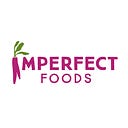4 Common Reasons That Packaged Foods Go To Waste
The problem of food waste is much bigger than just produce, which is why we’ve recently expanded our grocery lineup to include non-produce items like grains, nuts, oil, bread, and other pantry and snack drawer staples! We realize that while ugly produce is a particularly obvious example of why good food would get turned away by big retail stores, it isn’t as clear why perfectly good packaged foods wouldn’t be able to find a home.
To help clear things up, we wanted to share four common reasons why packaged foods go to waste and fall through the cracks of our food system:
Short-coded: The “use by” date is “too soon”
Ever wonder what the difference between a “sell by” and “use by” date really is? You’re not alone. Every year well-meaning people throw out hundreds of thousands of tons of perfectly good food due to the confusion of these expiration dates. We’ve also learned that grocery stores won’t stock items with expiration dates less than a few months away. To help close the loop on this needless source of food waste, we’ve started buying these “short-coded” items like our Chosen Foods avocado oil so they can find a good home instead of being stranded in a warehouse or ending up in a dumpster. By being more realistic about “best by” dates, we’re able to offer a more flexible solution than grocery stores and our customers are able to get a great deal on grocery staples that they’ll finish far before whatever the date on the side says.
Excess inventory: More than what can be sold through traditional outlets
Just like produce, surplus affects the packaged food world, too. Some years the market is flooded with a particular category of trendy food. Other times a buyer backs out of an order or changes the forecast for how much they’ll need, leaving producers and wholesalers with perfectly good food that suddenly has no future. Our lentils, for example, were part of a massive order placed by a large buyer who downsized their purchase at the last minute, leaving an organic grain producer in Montana with 250,000 pounds of lentils, which was way more than they had planned for! We’re able to be more flexible than large retail buyers and help find a home for surplus foods like these lentils that might otherwise fall through the cracks of our food system.
Off-spec: Not on par with the standards accepted by retail
Just like fruits and vegetables, packaged food products often have to meet certain cosmetic or otherwise superficial standards in order to be valued by our current food system. A great example of this is our peaberry coffee beans from Sightglass coffee. Peaberries are simply coffee beans that have a smaller, rounder shape than normal beans, however they have unique flavor characteristics. They are often sweeter when roasted, because their perfect roundness — technically a mutation — enables the roast to evenly encompass the little seed. We learned that while they’re a delicacy in some parts of the world, in the parts of Colombia, where Sightglass sources from, peaberries do not command a good buying price and end up getting blended with other beans instead of celebrated for what they are. Other examples of off-spec products that we’ve recovered include our “broken” brown rice and scarred almonds.
Packaging Change: Unintended consequence of a rebrand
Brands, like people, sometimes need a makeover. However, when a brand changes the packaging on one of their products, an unintended consequence is that the old packaging is often stuck in food purgatory. Our friends at Bob’s Red Mill recently updated their packaging to be even more sustainable, but this meant that they had a huge amount of products with the old packaging that they couldn’t sell to grocery stores. We came in and helped them make sure that these products would end up feeding people instead of a dumpster. Packaging updates are also the reason why we have exceptional pasta from our friends at Chickapea and Blue Evolution, both of whom can rest assured their product with old packaging isn’t going to waste as they begin selling products with their new packaging
We hope this helps shed some light and transparency on the world of packaged foods. The more we all know about our food system, the more empowered we can be to advocate for common sense solutions to the problem of food waste. Together, we can take an even bigger impact on food waste and make some truly delicious meals along the way!
